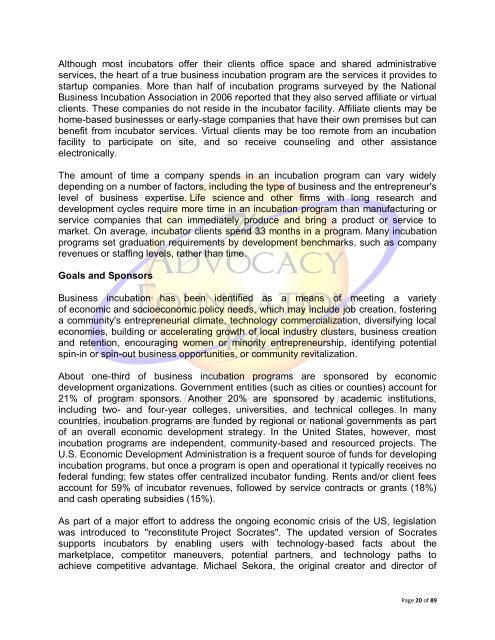The EDTC Incubator
The EDTC Incubator
The EDTC Incubator
You also want an ePaper? Increase the reach of your titles
YUMPU automatically turns print PDFs into web optimized ePapers that Google loves.
Although most incubators offer their clients office space and shared administrative<br />
services, the heart of a true business incubation program are the services it provides to<br />
startup companies. More than half of incubation programs surveyed by the National<br />
Business Incubation Association in 2006 reported that they also served affiliate or virtual<br />
clients. <strong>The</strong>se companies do not reside in the incubator facility. Affiliate clients may be<br />
home-based businesses or early-stage companies that have their own premises but can<br />
benefit from incubator services. Virtual clients may be too remote from an incubation<br />
facility to participate on site, and so receive counseling and other assistance<br />
electronically.<br />
<strong>The</strong> amount of time a company spends in an incubation program can vary widely<br />
depending on a number of factors, including the type of business and the entrepreneur's<br />
level of business expertise. Life science and other firms with long research and<br />
development cycles require more time in an incubation program than manufacturing or<br />
service companies that can immediately produce and bring a product or service to<br />
market. On average, incubator clients spend 33 months in a program. Many incubation<br />
programs set graduation requirements by development benchmarks, such as company<br />
revenues or staffing levels, rather than time.<br />
Goals and Sponsors<br />
Business incubation has been identified as a means of meeting a variety<br />
of economic and socioeconomic policy needs, which may include job creation, fostering<br />
a community's entrepreneurial climate, technology commercialization, diversifying local<br />
economies, building or accelerating growth of local industry clusters, business creation<br />
and retention, encouraging women or minority entrepreneurship, identifying potential<br />
spin-in or spin-out business opportunities, or community revitalization.<br />
About one-third of business incubation programs are sponsored by economic<br />
development organizations. Government entities (such as cities or counties) account for<br />
21% of program sponsors. Another 20% are sponsored by academic institutions,<br />
including two- and four-year colleges, universities, and technical colleges. In many<br />
countries, incubation programs are funded by regional or national governments as part<br />
of an overall economic development strategy. In the United States, however, most<br />
incubation programs are independent, community-based and resourced projects. <strong>The</strong><br />
U.S. Economic Development Administration is a frequent source of funds for developing<br />
incubation programs, but once a program is open and operational it typically receives no<br />
federal funding; few states offer centralized incubator funding. Rents and/or client fees<br />
account for 59% of incubator revenues, followed by service contracts or grants (18%)<br />
and cash operating subsidies (15%).<br />
As part of a major effort to address the ongoing economic crisis of the US, legislation<br />
was introduced to "reconstitute Project Socrates". <strong>The</strong> updated version of Socrates<br />
supports incubators by enabling users with technology-based facts about the<br />
marketplace, competitor maneuvers, potential partners, and technology paths to<br />
achieve competitive advantage. Michael Sekora, the original creator and director of<br />
Page 20 of 89

















